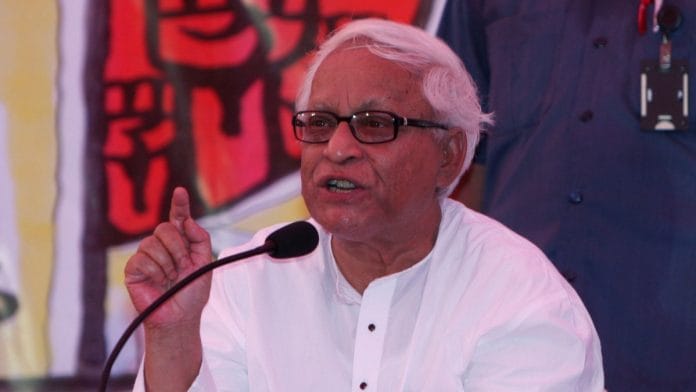The man who loved Karl Marx, the movies, Gabriel García Márquez and One Hundred Years of Solitude is no more.
The two-term chief minister of West Bengal, the poster boy of reform in the Left who didn’t care if the cat was black or white as long as it caught mice, that eternal Young Turk of India’s Communist movement, Buddhadeb Bhattacharjee, has now passed into history.
He died at 8:20 am today at his tiny, two-room house in Kolkata’s Palm Avenue. He hated hospitals and would refuse to stay there. This final time, he departed so quickly that no one had the chance to rush him there. Under treatment for years for chronic obstructive pulmonary disease, he had been suffering from a fever for the last couple of days. He is survived by his wife Meera and his son Suchetan Bhattacharjee. He had turned 80 on 1 March.
Coming to power
A student of Bengali literature at Presidency College, he joined the Communist Party of India (Marxist) in 1966. He came up the rungs as a student leader first, then went on to win in the landmark 1977 Assembly election, which saw the Left first come to power in West Bengal.
He lost the next election but returned as minister for information in 1987. In 1996, he was home minister. In the year 2000, when the West Bengal chief minister Jyoti Basu retired after 23 years in office, Bhattacharjee was the obvious and designated choice for successor. In 2006, he was chief minister again with the biggest-ever haul of seats in the Assembly – 235 out of 294.
Beginning of many endings
With that mandate, Mr Bhattacharjee pushed for industry as never before. Moments after being sworn in as chief minister, he and Ratan Tata, chairman of the Tata group, announced the Nano car factory in Singur. He thought he was heralding a new beginning for Bengal and beyond. Many shared his vision.
But it was the beginning of many endings.
How will history remember him? The man under whose watch a car factory turned into a metal graveyard? Under whose watch police firing at Nandigram left 14 dead? The Communist poster boy who ushered in the end of the red era in West Bengal? The chief minister who lost to Mamata Banerjee?
How would Buddhadeb Bhattacharjee want to be remembered? A politician with the soul of a poet, a man who loved cinema and watched movies even in the most challenging of times because, as he said, even the hungry man sings.
Monideepa Banerjie is a senior journalist based in Kolkata. She tweets @Monideepa62. Views are personal.
(Edited by Zoya Bhatti)






